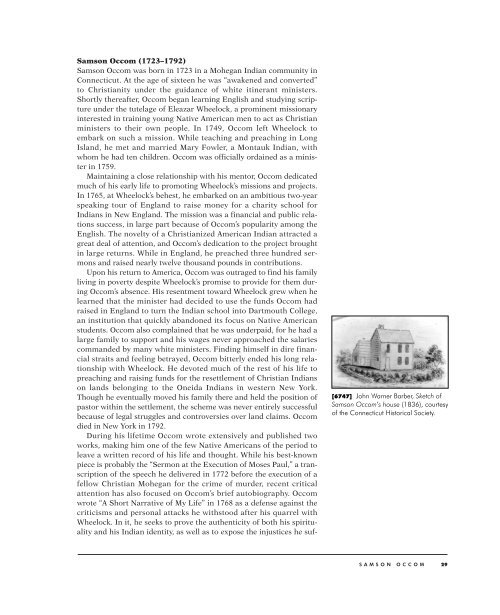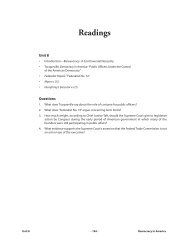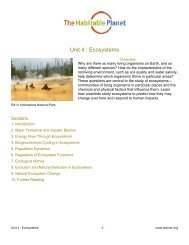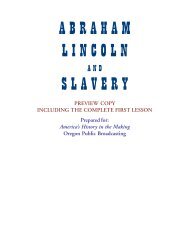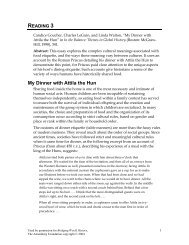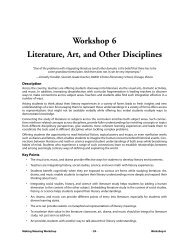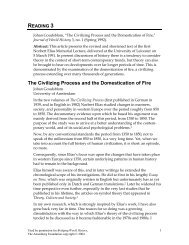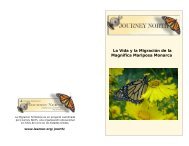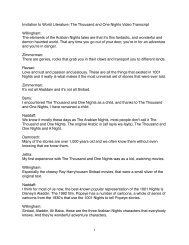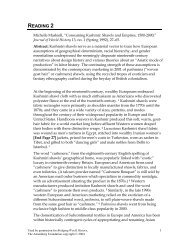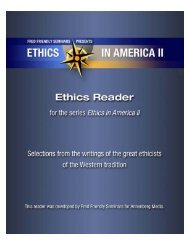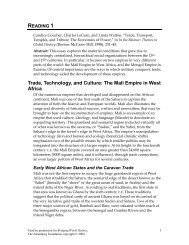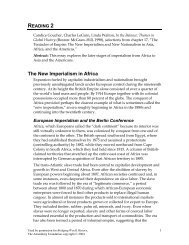UTOPIAN PROMISE - Annenberg Media
UTOPIAN PROMISE - Annenberg Media
UTOPIAN PROMISE - Annenberg Media
Create successful ePaper yourself
Turn your PDF publications into a flip-book with our unique Google optimized e-Paper software.
Samson Occom (1723–1792)<br />
Samson Occom was born in 1723 in a Mohegan Indian community in<br />
Connecticut. At the age of sixteen he was “awakened and converted”<br />
to Christianity under the guidance of white itinerant ministers.<br />
Shortly thereafter, Occom began learning English and studying scripture<br />
under the tutelage of Eleazar Wheelock, a prominent missionary<br />
interested in training young Native American men to act as Christian<br />
ministers to their own people. In 1749, Occom left Wheelock to<br />
embark on such a mission. While teaching and preaching in Long<br />
Island, he met and married Mary Fowler, a Montauk Indian, with<br />
whom he had ten children. Occom was officially ordained as a minister<br />
in 1759.<br />
Maintaining a close relationship with his mentor, Occom dedicated<br />
much of his early life to promoting Wheelock’s missions and projects.<br />
In 1765, at Wheelock’s behest, he embarked on an ambitious two-year<br />
speaking tour of England to raise money for a charity school for<br />
Indians in New England. The mission was a financial and public relations<br />
success, in large part because of Occom’s popularity among the<br />
English. The novelty of a Christianized American Indian attracted a<br />
great deal of attention, and Occom’s dedication to the project brought<br />
in large returns. While in England, he preached three hundred sermons<br />
and raised nearly twelve thousand pounds in contributions.<br />
Upon his return to America, Occom was outraged to find his family<br />
living in poverty despite Wheelock’s promise to provide for them during<br />
Occom’s absence. His resentment toward Wheelock grew when he<br />
learned that the minister had decided to use the funds Occom had<br />
raised in England to turn the Indian school into Dartmouth College,<br />
an institution that quickly abandoned its focus on Native American<br />
students. Occom also complained that he was underpaid, for he had a<br />
large family to support and his wages never approached the salaries<br />
commanded by many white ministers. Finding himself in dire financial<br />
straits and feeling betrayed, Occom bitterly ended his long relationship<br />
with Wheelock. He devoted much of the rest of his life to<br />
preaching and raising funds for the resettlement of Christian Indians<br />
on lands belonging to the Oneida Indians in western New York.<br />
Though he eventually moved his family there and held the position of<br />
pastor within the settlement, the scheme was never entirely successful<br />
because of legal struggles and controversies over land claims. Occom<br />
died in New York in 1792.<br />
During his lifetime Occom wrote extensively and published two<br />
works, making him one of the few Native Americans of the period to<br />
leave a written record of his life and thought. While his best-known<br />
piece is probably the “Sermon at the Execution of Moses Paul,” a transcription<br />
of the speech he delivered in 1772 before the execution of a<br />
fellow Christian Mohegan for the crime of murder, recent critical<br />
attention has also focused on Occom’s brief autobiography. Occom<br />
wrote “A Short Narrative of My Life” in 1768 as a defense against the<br />
criticisms and personal attacks he withstood after his quarrel with<br />
Wheelock. In it, he seeks to prove the authenticity of both his spirituality<br />
and his Indian identity, as well as to expose the injustices he suf-<br />
[6747] John Warner Barber, Sketch of<br />
Samson Occom’s house (1836), courtesy<br />
of the Connecticut Historical Society.<br />
SAMSON OCCOM 29


